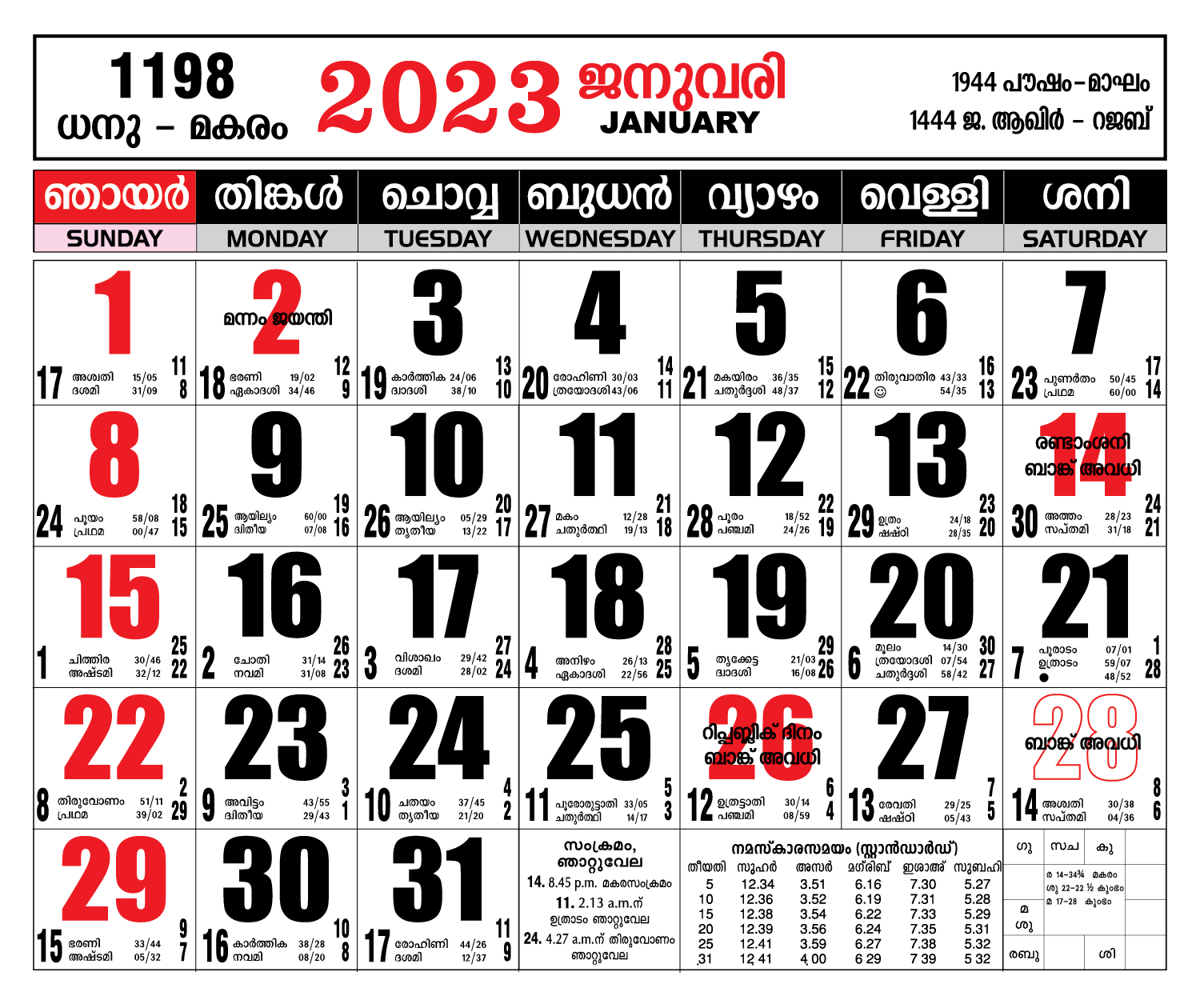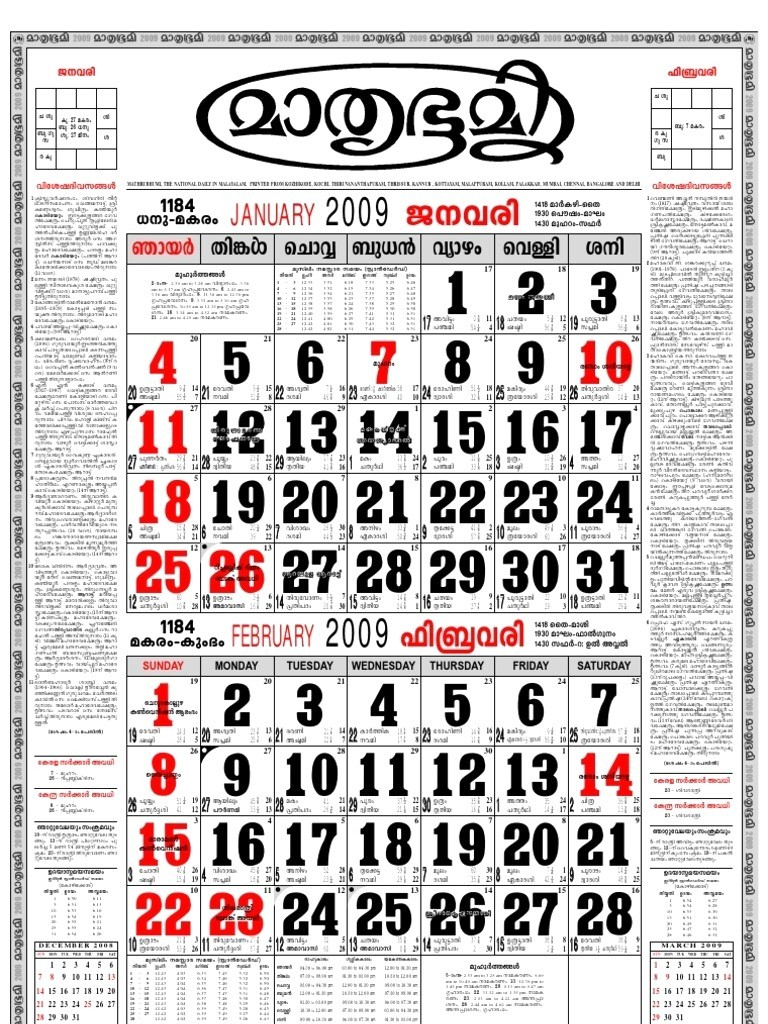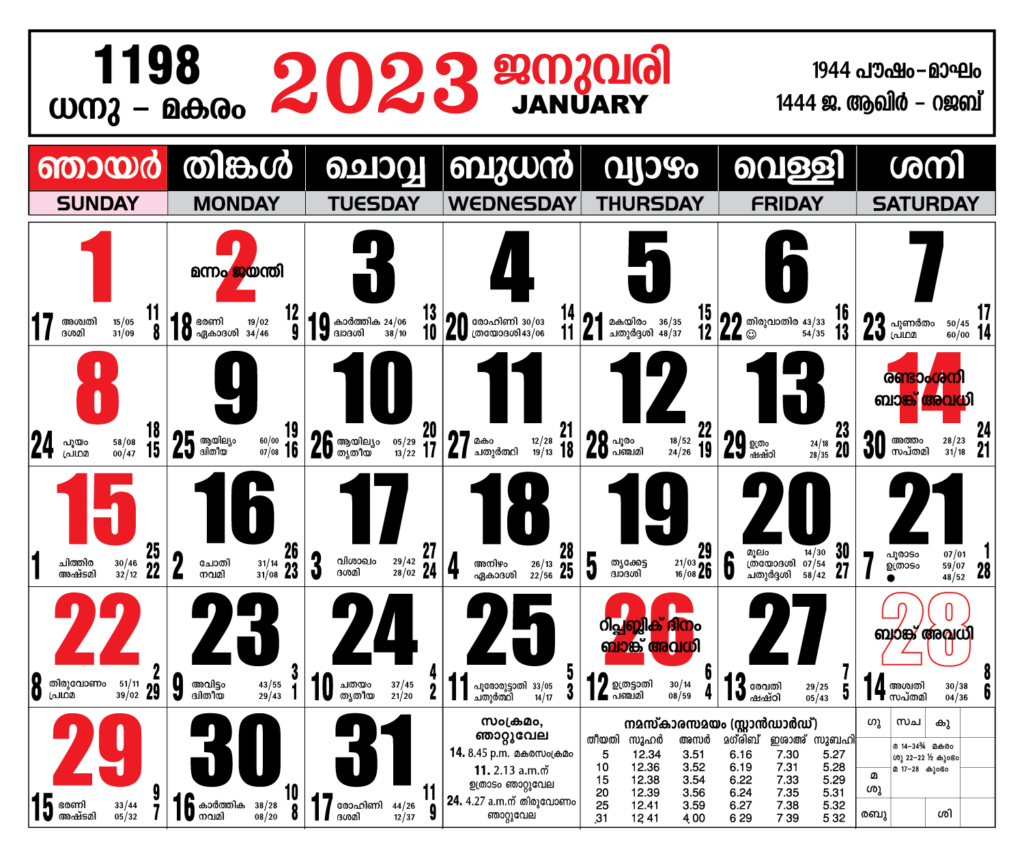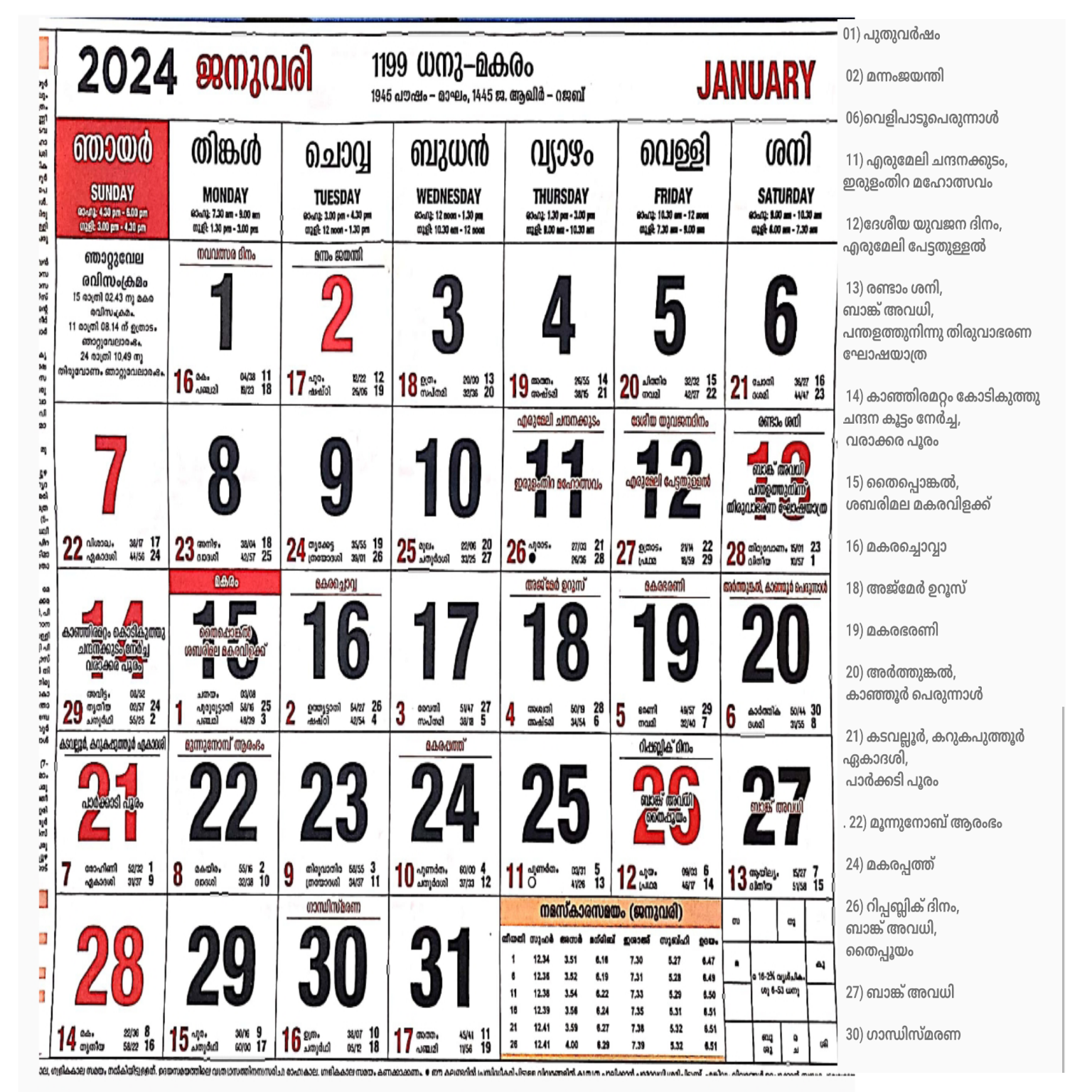
Introduction
january 2026 malayalam calendar april represents a significant subject within its field, encompassing a range of practices, traditions, or applications that shape daily life and broader cultural or professional landscapes. Understanding the specific intersection of the Gregorian months of January and April 2026 with the Malayalam calendar provides clarity about its background, its present relevance, and the way it continues to influence various aspects of society, particularly within the state of Kerala and among the global Malayalam diaspora. This exploration delves into the intricacies of calendar systems, their cultural implications, and their practical applications.
Definition and Origin of january 2026 malayalam calendar april
The term "january 2026 malayalam calendar april" refers to the specific alignment and details of the Gregorian months of January and April in the year 2026 as they correspond with the traditional Malayalam calendar. To fully grasp this, an understanding of both calendar systems is essential.
The Gregorian calendar, widely adopted globally, is a solar dating system. January marks the beginning of the year, while April is the fourth month. In 2026, these months will follow their standard progression.
The Malayalam calendar, also known as the Kollavarsham, is a lunisolar calendar used primarily in Kerala. Its era began in 825 CE. Unlike the Gregorian calendar, which is based solely on the Earth’s orbit around the sun, the Malayalam calendar incorporates both lunar cycles and solar years. Its months are named after the constellations through which the sun passes, such as Chingam, Kanni, Thulam, Vrischikam, Dhanu, Makaram, Kumbham, Meenam, Medam, Edavam, Midhunam, and Karkidakam. The start of the Malayalam year typically falls in mid-August (Chingam).
The significance of the phrase "january 2026 malayalam calendar april" lies in the need to cross-reference dates between these two distinct systems. For instance, January 2026 will span parts of the Malayalam months of Dhanu and Makaram. Dhanu (mid-December to mid-January) is known for the Mandalam-Makaravilakku festival season, culminating in Makara Sankranti. Makaram (mid-January to mid-February) is also culturally significant. Similarly, April 2026 will encompass parts of Meenam and Medam. Medam (mid-April to mid-May) is particularly notable as it typically marks Vishu, the Malayalam New Year, a major festival.
The origin of this dual calendar usage stems from historical and cultural factors. While the Gregorian calendar became the standard for administrative and international purposes, the Malayalam calendar retained its importance for religious observances, agricultural cycles, personal events (like births and marriages), and astrological calculations. The need to translate or understand dates across these systems became a practical necessity for daily life in Kerala, fostering a unique blend of temporal understanding.
Importance of january 2026 malayalam calendar april Today
The continued relevance of understanding the specific calendar details for January and April 2026 within the Malayalam system is multifaceted. For individuals residing in Kerala or those with strong cultural ties to the region, this information is crucial for planning and participation in various aspects of life.
Culturally, these months often host significant festivals and observances. January, for example, is deeply intertwined with the conclusion of the Sabarimala pilgrimage season, marked by Makara Sankranti and the Makara Vilakku festival, which typically falls in mid-January. Knowing the precise Malayalam date for this period allows devotees to plan their spiritual activities. April, as previously mentioned, is synonymous with Vishu, a festival of great importance, celebrated with traditional rituals, family gatherings, and the giving of ‘Vishukaineetam’ (money gifts). Accurate calendar alignment ensures these traditions are observed correctly.
Economically, businesses, especially those catering to traditional markets or tourism, rely on these calendar insights. Retailers might stock specific items for festivals, while tour operators plan packages around pilgrimage seasons or cultural events. The agricultural sector, though less dependent on the precise Gregorian month, still uses traditional Malayalam calendar markers for planting and harvesting cycles, which indirectly influences market availability during these periods.
Socially, the Malayalam calendar dictates auspicious times (muhurthams) for life events such as weddings, housewarmings, and naming ceremonies. Families consult astrologers who use the Malayalam calendar and astrological charts to determine favorable dates. Understanding the specific Malayalam dates corresponding to January and April 2026 enables individuals to schedule these significant personal milestones appropriately. Educational institutions and government bodies also factor in major festival dates from the Malayalam calendar when setting holidays and academic schedules, even if their primary framework is Gregorian.
Benefits of january 2026 malayalam calendar april
The ability to navigate and interpret the calendar information for January and April 2026 within the Malayalam context offers several distinct benefits:
- Enhanced Cultural Preservation: It helps maintain and perpetuate traditional customs, rituals, and festivals. By understanding the specific dates, communities can ensure the continuity of their heritage.
- Improved Personal and Professional Planning: Individuals and organizations can effectively plan events, travel, and work schedules, avoiding conflicts with significant cultural or religious observances. This is particularly vital for those managing international or inter-cultural projects involving Kerala.
- Facilitation of Religious Observance: For adherents of various faiths, particularly Hinduism, the Malayalam calendar dictates auspicious days for prayers, fasting, and temple visits. Knowing the precise dates for January and April 2026 allows for accurate adherence to these spiritual practices.
- Astrological Accuracy: Astrologers and those who follow astrological guidance rely heavily on the Malayalam calendar for precise calculations related to horoscopes, planetary positions, and auspicious timings.
- Educational and Research Value: For scholars, historians, and cultural enthusiasts, a detailed understanding of these calendar intersections provides valuable insights into Kerala’s socio-cultural fabric and its historical evolution.
Applications of january 2026 malayalam calendar april
The practical applications of understanding the calendar details for January and April 2026 in the Malayalam system are diverse and touch various aspects of daily life:
- Festival Planning: The most apparent application is in planning for major festivals. As noted, Makara Sankranti/Makara Vilakku in January and Vishu in April are key examples. Families plan gatherings, prepare traditional foods, and arrange temple visits based on these dates.
- Event Scheduling: From community events and school functions to public holidays and business meetings, understanding the Malayalam calendar’s influence on these months helps in scheduling to maximize participation and respect cultural sensitivities.
- Personal Milestones: Marriages, housewarming ceremonies, and other family celebrations are often planned according to auspicious dates derived from the Malayalam calendar. Individuals consult priests or astrologers to identify suitable days within January and April 2026.
- Agricultural Practices: While modern agriculture uses scientific methods, traditional farmers might still refer to the Malayalam calendar for certain planting or harvesting periods, particularly for specific crops or rituals associated with the land.
- Media and Publishing: Newspapers, magazines, and digital platforms in Kerala frequently publish daily calendar information, including Gregorian and Malayalam dates, alongside details of festivals and auspicious times, serving as a vital resource for the public.
- Tourism: Tour operators marketing Kerala as a destination often highlight festivals and cultural events occurring in January and April, requiring precise calendar knowledge to promote these experiences accurately.
Challenges and Future of january 2026 malayalam calendar april
Despite its enduring importance, the subject of understanding the calendar details for January and April 2026 within the Malayalam system faces certain challenges, while also presenting opportunities for future development.
One primary challenge is the inherent complexity of managing two distinct calendar systems simultaneously. For those unfamiliar with the Malayalam calendar, correlating dates can be confusing, potentially leading to errors in planning or missed observances. This is particularly true for younger generations or those living outside Kerala who may have less exposure to traditional practices. The absence of a universally standardized digital tool that seamlessly integrates and explains these calendar overlaps can also be a hurdle.
Another challenge lies in the preservation of traditional knowledge. As societies modernize, there is a risk that the intricacies of the Malayalam calendar, including its astrological nuances and the cultural significance of each day, might diminish if not actively taught and practiced.
However, the future of understanding the calendar details for January and April 2026 within the Malayalam context appears robust due to several factors. The rise of digital technology offers significant opportunities. Mobile applications and online platforms are increasingly providing accurate and user-friendly interfaces for cross-referencing Gregorian and Malayalam dates, making this information more accessible than ever before. These digital tools can also incorporate features like festival reminders and auspicious time notifications.
Furthermore, cultural revival efforts and the strong sense of identity among the Malayalam diaspora ensure that the calendar’s importance will persist. Educational initiatives, both formal and informal, play a crucial role in passing down this knowledge to future generations. The continued spiritual and cultural significance of festivals like Vishu and Makara Vilakku guarantees that the need to understand these specific calendar alignments will remain relevant.
FAQs about january 2026 malayalam calendar april
Q1: What is january 2026 malayalam calendar april?
A1: This refers to the specific correspondence and details of the Gregorian months of January and April in the year 2026 as they align with the traditional Malayalam calendar (Kollavarsham). It involves understanding which Malayalam months and days fall within these Gregorian periods. For example, January 2026 will cover parts of Dhanu and Makaram, while April 2026 will span parts of Meenam and Medam.
Q2: Why is january 2026 malayalam calendar april important?
A2: Its importance stems from cultural, religious, and practical reasons. It enables individuals and communities to accurately observe traditional festivals (like Makara Sankranti and Vishu), plan auspicious personal events (weddings, housewarmings), manage agricultural cycles, and coordinate schedules within the unique cultural context of Kerala.
Q3: What are the main benefits of january 2026 malayalam calendar april?
A3: The main benefits include enhanced cultural preservation, improved personal and professional planning, accurate facilitation of religious observances, greater astrological precision, and significant educational and research value regarding Kerala’s cultural heritage.
Q4: How can january 202alam calendar april be applied in daily life?
A4: It is applied in daily life for planning festival celebrations, scheduling personal milestones (like weddings or naming ceremonies), coordinating public and private events, managing agricultural activities, and providing information through media outlets.
Q5: What challenges are associated with january 2026 malayalam calendar april?
A5: Challenges include the complexity of navigating two distinct calendar systems, potential confusion for those unfamiliar with the Malayalam calendar, and the need to actively preserve traditional knowledge in a modernizing world.
Tips for january 2026 malayalam calendar april
To effectively utilize and understand the calendar information for January and April 2026 within the Malayalam context, several tips can be beneficial:
- Understand the fundamentals. Familiarize oneself with the basic structure of both the Gregorian and Malayalam calendars, including their month names, year beginnings, and the general periods they cover. This foundational knowledge simplifies cross-referencing.
- Focus on practical use. Identify the specific events, festivals, or personal milestones that require Malayalam calendar dates during January and April 2026. Prioritize understanding those particular correspondences for immediate practical application.
- Stay updated on new trends or research. While the calendar itself is ancient, modern tools and interpretations evolve. Utilize reliable digital calendar apps, websites, or local almanacs (panchangam) that provide accurate Gregorian-Malayalam date conversions and festival information.
- Avoid common mistakes. Be cautious of relying solely on general assumptions. Always cross-verify dates, especially for critical events, using authoritative sources to prevent errors due to slight variations in calendar calculations or regional interpretations.
- Adopt a long-term approach. For those deeply invested in the culture, understanding the cyclical nature of the Malayalam calendar and its recurring festivals in relation to the Gregorian year can aid in long-term planning and foster a deeper appreciation for the tradition.
Conclusion about january 2026 malayalam calendar april
The subject of january 2026 malayalam calendar april, representing the specific alignment of the Gregorian months of January and April 2026 with the traditional Malayalam calendar, holds enduring significance. It serves as a vital bridge between modern global timekeeping and deeply rooted cultural practices in Kerala. This understanding is essential for the accurate observance of religious festivals, the meticulous planning of personal and community events, and the preservation of a rich heritage. While the dual calendar system presents complexities, its benefits in maintaining cultural identity, facilitating spiritual adherence, and enabling effective daily planning far outweigh these challenges. As technology continues to offer accessible tools for calendar integration, the relevance of understanding these specific calendar intersections is set to remain a central element of progress and cultural continuity into the future, ensuring that the unique temporal rhythm of Kerala continues to thrive.







Leave a Reply